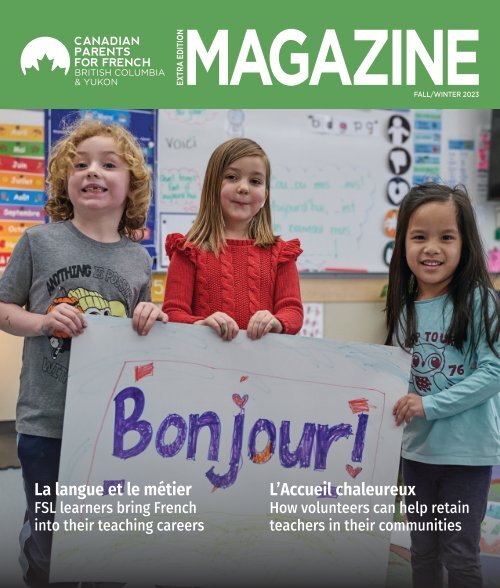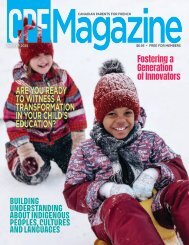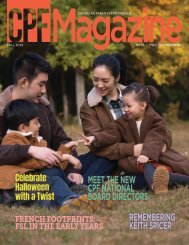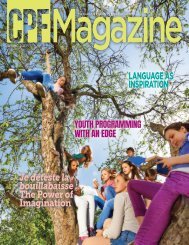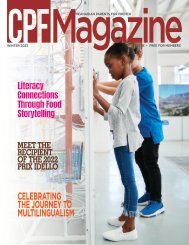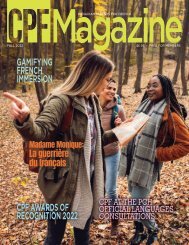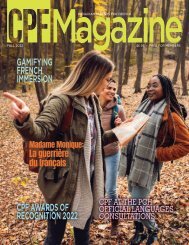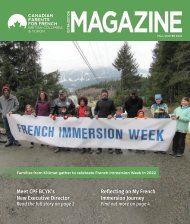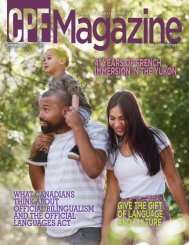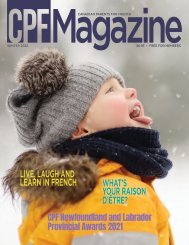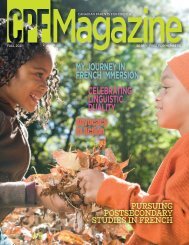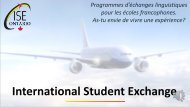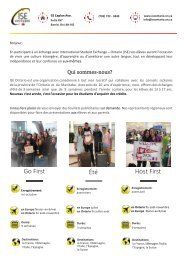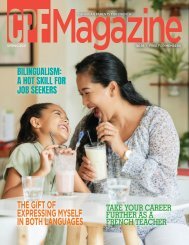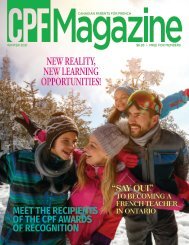CPF BC & Yukon Fall 2023 Magazine
A BC and Yukon network of volunteers, parents and stakeholders who value French as an integral part of Canada. The BC & Yukon Branch Fall 2023 Magazine is dedicated to the promotion and creation of French-second-language learning opportunities for young Canadians.
A BC and Yukon network of volunteers, parents and stakeholders who value French as an integral part of Canada. The BC & Yukon Branch Fall 2023 Magazine is dedicated to the promotion and creation of French-second-language learning opportunities for young Canadians.
You also want an ePaper? Increase the reach of your titles
YUMPU automatically turns print PDFs into web optimized ePapers that Google loves.
EXTRA EDITION<br />
MAGAZINE<br />
FALL/WINTER <strong>2023</strong><br />
La langue et le métier<br />
FSL learners bring French<br />
into their teaching careers<br />
L’Accueil chaleureux<br />
How volunteers can help retain<br />
teachers in their communities
La langue et le métier<br />
We know that learning French can unlock all kinds of opportunities, including social,<br />
travel, and educational. The following stories highlight examples of French second<br />
language learners who brought their skill into their teaching careers.<br />
Alexis Ewacha<br />
Initially, Alexis Ewacha never set out to teach French<br />
Immersion. Alexis earned her Bachelor of Arts from<br />
the University of <strong>BC</strong> (U<strong>BC</strong>); majoring in history, with<br />
a minor in geography.<br />
“After high school, I wasn’t sure what I wanted<br />
to do,” explains the 24-year-old, adding that taking<br />
history was influenced by her father, a history<br />
teacher. “However, during my second year at U<strong>BC</strong>,<br />
I decided to go into teaching, to pursue my love of<br />
both history and French.”<br />
Alexis was exposed to French early on. Her<br />
parents thought their daughter should be academically<br />
challenged, so they enrolled Alexis in French Immersion<br />
in kindergarten. “Neither of my parents spoke French, but they<br />
had friends whose children were in French Immersion,” says Alexis.<br />
She soon excelled at French. An exchange program to Quebec<br />
City for three weeks in Grade 10 cemented her love for the French<br />
language. “I thought it was really cool to speak another language,”<br />
says Alexis. “French Immersion expanded my curiosity.”<br />
Eliesse Harpaz<br />
Initially, Alexis Ewacha never set out to teach French Immersion. Alexis earned her Bachelor of<br />
Arts from the University of <strong>BC</strong> (U<strong>BC</strong>); majoring in history, with a minor in geography.<br />
“After high school, I wasn’t sure what I wanted to do,” explains the 24-year-old, adding that<br />
taking history was influenced by her father, a history teacher. “However, during my second year<br />
at U<strong>BC</strong>, I decided to go into teaching, to pursue my love of both history and French.”<br />
Alexis was exposed to French early on. Her parents thought their daughter should be<br />
academically challenged, so they enrolled Alexis in French Immersion in kindergarten.<br />
“Neither of my parents spoke French, but they had friends whose children were in French<br />
Immersion,” says Alexis.<br />
She soon excelled at French. An exchange program to Quebec City for three weeks in Grade 10<br />
cemented her love for the French language.<br />
As the youngest teacher at Burnaby’s École Brantford<br />
Elementary, Eliesse Harpaz proves that French<br />
Immersion opens up doors. At 23, Eliesse was hired<br />
by her alma mater to teach full time in a Grade 5/6<br />
split French Immersion class.<br />
“Most new teachers have to substitute when<br />
they first start out, but I never did … I went right into<br />
my own classroom,” says the now 25-year-old, adding<br />
French came easily to her. “I credit my mom for immersing<br />
me in the language. My mother was adamant<br />
that I learn another language, because she felt I would<br />
have more opportunities in Iife if I pursued French.”<br />
Eliesse attended French Immersion throughout<br />
elementary and high school. She also participated in several<br />
Concours d’art oratoire district competitions, and was a junior leader<br />
and then leader with Vancouver Island’s <strong>BC</strong> Family French Camp.<br />
One of Eliesse fondest memories was a Grade 11 school trip to<br />
France, walking along the famous Champs-Elysées Street with her<br />
classmates listening to Parisians speak.<br />
“As for exchanges, I also participated in the Explore program<br />
“I thought it was really cool to speak another language,” says Alexis. “French Immersion<br />
expanded my curiosity.”<br />
After her first year of university, she admits she felt a little intimidated and nervous with her<br />
“rusty French speaking skills.”<br />
After her first year of university, she admits she<br />
felt a little intimidated and nervous with her “rusty<br />
French speaking skills.” That got her questioning<br />
if any of her classmates also thought of linguistic<br />
insecurity, which is feelings of anxiety or a lack of<br />
confidence when speaking a second language.<br />
“During my practicum, teaching a Grade 10<br />
social studies class, we discussed linguistic insecurity,<br />
even though the students were from Francophone<br />
families,” says Alexis. “I found out it was a<br />
very common feeling. In order to help alleviate that<br />
insecurity, I had to encourage a sense of comfort.”<br />
Alexis is a French Immersion teacher, with a<br />
special interest in linguistic insecurity, at her former high school,<br />
École Earl Marriott Secondary. Here, she encourages her students<br />
to think about how French fluency can expand their horizons.<br />
“French Immersion teachers are in high demand, and at 24 I<br />
had my own classroom,” says Alexis. “Studying French helped me<br />
secure a full-time teaching position much faster.”<br />
twice, the first at the Université du Quebec à<br />
Trois-Rivieres (UQTR), and the second at Université<br />
de Montreal (UdeM),” says Eliesse. “These are great<br />
government-sponsored programs that everyone<br />
should take advantage of.”<br />
That’s not all. Eliesse volunteered with programs<br />
such as Forum for Young Canadian in Ottawa, where<br />
French came in very handy.<br />
It was in Grade 11 that Eliesse decided she<br />
would continue her French studies. She received a<br />
Bachelor of Arts with a Major in French from Simon<br />
Fraser University (SFU), before attending the University<br />
of B.C. for a Bachelors of Education.<br />
She can’t emphasize enough how being multilingual has<br />
enriched her life. “There is so much value in being able to speak our<br />
country’s two official languages… it makes connecting and traveling<br />
much more interesting,” says Eliesse.<br />
Meantime, for her students Eliesse hopes to inspire them to<br />
see the value and many advantages to speaking French.<br />
2 | CANADIAN PARENTS FOR FRENCH <strong>BC</strong> & YUKON FALL <strong>2023</strong>
More than 1.7 million Canadian students are<br />
enrolled in French second language programs,<br />
including close to 1.3 million in Core French and<br />
450,000 in French immersion.<br />
Danielle Senyk<br />
Although Danielle Senyk’s father grew up in Quebec<br />
and spoke a little French, it wasn’t until Grade 5 that<br />
Danielle was exposed to French.<br />
“I was in a fairly small school and Core French was<br />
a relatively new program,” says Danielle. “Although<br />
both my parents and teachers encouraged me, it was<br />
my choice to take French Immersion in Middle School<br />
because I liked the language.”<br />
Her parents enrolled her at New Westminster’s<br />
École Glenbrook Middle School in late French Immersion.<br />
“I did find it challenging at the beginning because<br />
some of the other students in my class already spoke<br />
a little French,” says Danielle. “Verbal presentations<br />
weren’t my favourite thing but I was strong at it. I’m a huge advocate for<br />
late French Immersion because it was such an enriching experience.”<br />
Even though Danielle found it difficult at times, she persevered<br />
through to Grade 12. A trip to Quebec with a friend in Grade 12<br />
reinforced her decision to further her French studies.<br />
After high school, Danielle was accepted into the French<br />
Dylan Trerice<br />
Growing up, Dylan Trerice loved listening to his Italian<br />
grandparents speak in their mother tongue.<br />
“I remember watching my Nonna speaking Italian<br />
and wondering how it felt to communicate fluently in<br />
another language,” says the Vancouver Island French<br />
Immersion teacher and Canadian Parents for French <strong>BC</strong><br />
and <strong>Yukon</strong> Branch board members.<br />
Unbeknownst to Dylan at the time, thus began<br />
his love for bilingualism.<br />
Throughout elementary and high school, his<br />
parents enrolled him in the Core French program.<br />
“In high school, I had the most brilliant Core French<br />
teacher, who recognized that I was really good in<br />
French,” says Dylan. “She told me that being so<br />
proficient, it could open up so many doors for me.”<br />
The core French program taught Dylan the beauty and magic of<br />
learning French by learning how elements such as vocabulary, grammar,<br />
and culture were intertwined and connected to boost proficiency.<br />
His most precious high school memories were of a Grade 10<br />
exchange trip to Paris for two weeks. Immersing himself completely<br />
CANADIAN PARENTS FOR FRENCH <strong>BC</strong> & YUKON FALL <strong>2023</strong><br />
program at Simon Fraser University (SFU).<br />
“Because I was in French Immersion in high<br />
school, I was able to skip a few beginner courses at<br />
SFU,” Danielle says, adding she knew from Grade 2<br />
that she wanted to become a teacher. “Studying<br />
French taught me to appreciate the beauty of<br />
speaking a second language and to recognize the<br />
value of other cultures.”<br />
As the second most widely learned language in<br />
the world after English, Danielle knows that learning<br />
French is inherently valuable. As a French Immersion<br />
kindergarten teacher at Qayqayt Elementary<br />
in her hometown, she enjoys communicating her<br />
feelings of the language with her young students.<br />
“I love French so much, and in kindergarten it’s challenging<br />
because you want to make sure your message is conveyed in a<br />
welcoming way,” says Danielle. “I recognize my students are<br />
coming into a new language, so I try to incorporate as much<br />
play as possible into the learning.”<br />
in the language, he felt a “huge sense of pride and<br />
joy to be able to communicate clearly in French with<br />
the locals.”<br />
After high school, Dylan attended the University<br />
of Victoria (UVic), where he completed an undergraduate<br />
degree in French studies, literature, culture and<br />
linguistics. “At university, my professors encouraged<br />
me to go for a Master’s in French Studies,” he adds.<br />
“I spent half a year at UVic and another six months in<br />
Montpellier, France.”<br />
With his Master’s under his belt, a professor<br />
offered him the chance to teach university level<br />
French labs. He knew he’d found his calling.<br />
Now in his sixth-year teaching French Immersion, Dylan is<br />
passing on his passion for French to his own students.<br />
“As a French Immersion teacher, I intertwine teaching<br />
philosophies and techniques unique to Core French with those of<br />
the French Immersion model so that my students are inspired to<br />
take a much more active and inquisitive role in developing their<br />
proficiency of French,” says Dylan.<br />
| 3
L’Accueil chaleureux<br />
Canadian Parents for French (<strong>CPF</strong>) is mobilizing its networks of<br />
volunteers under an initiative to help retain French second<br />
language (FSL) public school teachers in communities throughout<br />
British Columbia.<br />
With the participation of the Government of Canada and the<br />
Ministry of Education and Child Care of British Columbia, L’accueil<br />
chaleureux: New French Teacher Welcome Project is focused on<br />
improving retention of new FSL teachers in their first three years of<br />
teaching. By working with dedicated volunteers, <strong>CPF</strong> can help new<br />
FSL teachers feel better connected socially and culturally in their<br />
new home communities.<br />
The project, which launched in late 2022 and continues until<br />
June 2024, has two components. The first involves community hosts<br />
who will introduce new teachers to the community during a series<br />
of outings during the school year, helping to make social connections<br />
and show what makes their community a special place to live. The<br />
second component encourages new teachers to organize Frenchlanguage<br />
community events to improve their confidence and<br />
enthusiasm for teaching French.<br />
The story below is an example of the difference <strong>CPF</strong> volunteers<br />
can have by making their community a welcoming place for newly<br />
arrived teachers.<br />
Lynne Côté-Aubin<br />
The Story of a Fort St. John Principal<br />
Canadian Parents for French<br />
volunteers made Lynne Côté-Aubin<br />
feel at home in Fort St. John when<br />
she arrived in the Northern <strong>BC</strong><br />
community to teach in 1990 from<br />
Sturgeon <strong>Fall</strong>s, Ontario. She put her<br />
roots in Fort St. John and eventually became<br />
principal at Ecole Central Elementary School.<br />
Lynne tells us how, in addition to the type of<br />
school district support she received, efforts<br />
like the teacher retention project can make<br />
a major difference for new arrivals.<br />
Tell us about your first impressions<br />
of moving to Fort St. John? I was<br />
scared because I was fresh out of university<br />
and brand new to teaching. I loved Fort<br />
St. John from the moment I arrived because<br />
the school and the city were very welcoming.<br />
How did the welcome you received<br />
affect your experience as a new<br />
teacher? It made a huge difference! I felt<br />
included from the start by the staff as well<br />
as the parent community. All new teachers<br />
were adopted by a <strong>CPF</strong> host family. We were<br />
included in outings, dinners, celebrations,<br />
etc. These events ensured we felt like we<br />
belonged and gave us a sense of community.<br />
When did you realize that you were<br />
never going to leave? That is a funny<br />
story! My adoptive family invited me to<br />
Thanksgiving dinner where I met my<br />
husband. He was my adoptive father’s<br />
brother. After meeting my husband, Bert,<br />
I knew I was never going to leave. The<br />
outdoors (fishing, hunting, gardening,<br />
nature, mountains) also played an important<br />
part in my decision. I fell in love with my soul<br />
mate and the province.<br />
What has been the best part about<br />
settling in a small town in <strong>BC</strong>? I love<br />
the fact that I can get from point A to point<br />
B in the town in a relatively short amount of<br />
time, everyone is friendly and I feel I have a<br />
huge network of support. Our school district<br />
staff are approachable and very supportive,<br />
also an advantage to a smaller school<br />
district. There are many opportunities<br />
for advancement.<br />
Do you have any advice for new<br />
teachers who are starting their<br />
careers? Be patient! You will not know<br />
everything from the start. Don’t be afraid to<br />
ask for help and be open to collaboration.<br />
Lastly, involve yourself in the community!<br />
4 | CANADIAN PARENTS FOR FRENCH <strong>BC</strong> & YUKON FALL <strong>2023</strong>
Are postsecondary studies<br />
in French worth the effort?<br />
Oh que oui!<br />
For students who have spent years studying French in school, the<br />
decision regarding where and in which language to pursue their<br />
postsecondary studies isn’t always an easy one.<br />
The Bursaries for Postsecondary Studies in French as a Second<br />
Language Program might help with their decision. The Program<br />
encourages young Canadians whose first official language spoken<br />
is English to study in French. It is designed to help students starting<br />
a college or university program to enhance their bilingualism while<br />
studying in their field of interest. These non-renewable $3,000<br />
bursaries are currently available in more than 25 colleges and<br />
universities across Canada.<br />
How does it work?<br />
Students need to be registered in a program in which at least 50%<br />
of courses and program-related activities are offered in French.<br />
Considering the cost of living and of college or university education,<br />
this financial support has been more than welcome for Mélissa Yu:<br />
“In truth, the bursary significantly reduced the financial burden of<br />
tuition fees. But more importantly, I perceived it as a recognition<br />
for all the efforts I invested in pursuing my postsecondary studies<br />
in French.”<br />
Being bilingual offers several benefits: better employment<br />
opportunities, higher wages, and expanding knowledge about<br />
another culture, among others.<br />
In a recent survey of 2022-<strong>2023</strong> bursary recipients, most respondents<br />
(89.3%) stated that taking postsecondary classes in French helped<br />
them improve their conversational skills. Jennifer Chang can attest to<br />
this: “[Receiving the bursary] opened the prospect of bilingualism and<br />
bolstered my confidence in my French-language skills. I hope to work<br />
in a Francophone setting in the future.”<br />
What would Mélissa Yu say to students who are hesitant about<br />
continuing their studies in French?<br />
“Do not waver! Although studying in French may seem intimidating<br />
at first, and may sometimes be difficult, it is worth it. It is a wonderful<br />
opportunity to learn more about a different culture and language. You<br />
will be presented with an entire range of opportunities in the future,<br />
whatever your career path, and wherever you choose to work.”<br />
The Bursaries for Postsecondary Studies in French as a Second<br />
Language Program is funded by the Government of Canada and<br />
administered by the Association des collèges et universités de la<br />
francophonie canadienne (ACUFC).<br />
To find out more about eligibility<br />
criteria and the colleges<br />
and universities across Canada<br />
offering the FSL bursary,<br />
visit ACUFC.ca/FSLbursaries.<br />
TWO LANGUAGES,<br />
TWICE THE POSSIBILITIES<br />
FRENCH COHORT PROGRAM<br />
IN PUBLIC & INTERNATIONAL AFFAIRS<br />
DISCOVER THE MANY BENEFITS OF STUDYING IN THIS<br />
MULTIDISCIPLINARY BACHELOR’S DEGREE:<br />
• Bilingual program<br />
• Student exchange in Europe or in Québec<br />
• Field s tudies and community-based projec ts<br />
• Small cohort + exclusive courses and services<br />
• Up to $14,500 in bursaries and awards<br />
for s tudies in French<br />
TO LEARN MORE, VISIT<br />
SFU.CA/BAFF-OFFA/FCP<br />
CANADIAN PARENTS FOR FRENCH <strong>BC</strong> & YUKON FALL <strong>2023</strong><br />
| 5
Canadian Parents for French’s Concours d’art oratoire is<br />
Canada’s largest, annual French-language public-speaking<br />
competition, involving thousands of students every year, and<br />
thousands of dollars worth of prizes.<br />
The aim of this public speaking contest is to stimulate the<br />
interest of students learning French, to improve their speaking<br />
skills, and to give them experience presenting in public.<br />
This event is organized by Canadian Parents for French<br />
(<strong>CPF</strong>), who has worked together with parents and school staff<br />
since 1983 to organize school, district, and provincial-level<br />
competitions. Concours is open to French Second Language<br />
Provincial Concours<br />
occurs on the first<br />
Saturday in May.<br />
Stay tuned<br />
for 2024!<br />
(FSL) and Francophone students from grades 6 through 12 who<br />
are studying Core (Basic) or Intensive French, French immersion<br />
(Early or Late), or studying in a <strong>BC</strong> Francophone school (Conseil<br />
scolaire francophone).<br />
Over 150 students participated in the provincial finals of the<br />
Concours d’art oratoire <strong>2023</strong>. Five <strong>BC</strong> students from Grades 11<br />
and 12 had the opportunity to participate later in the National<br />
competition, where the three following students placed first in<br />
their respective categories. Congratulations to all of the <strong>2023</strong><br />
participants! We look forward to welcoming students again to<br />
the 2024 provincial finals on May 4th.<br />
Dhruv Mehta<br />
I began learning French at school in grade five, and immediately, I was fond of the language’s elegance. Over<br />
the years, school has taught me to become a more eloquent French speaker, by introducing intricate vocabulary<br />
and useful sentence structures that have improved the overall quality of my written and spoken French.<br />
I thoroughly enjoyed the experience of this year’s Concours d’art oratoire, the extravagance of which<br />
was enhanced by a variety of innovative topics and passionate students.<br />
Through Concours, I aspired to not only improve my French skills, but also leave a relevant message that<br />
would resonate with current global affairs and provide the audience with a unique perspective of our world.<br />
Achieving this goal required persistent efforts, which included drafting and refining my speech, alongside<br />
practicing it regularly to maintain fluency.<br />
Before participating in Concours, I found it difficult to answer questions on the spot, as they immensely<br />
challenged my knowledge of French grammar. However, the various levels of Concours allowed me to hone<br />
my critical-thinking and improvisation abilities, which were not only useful for the competition, but also at<br />
school. In general, the Concours d’art oratoire was an excellent opportunity that broadened my knowledge<br />
and increased my confidence.<br />
Shreyanshi Vala<br />
My French learning journey started back in grade six as I took part in the Late French Immersion<br />
Program. I remember being extremely excited to embark on the journey and learn something more<br />
than “bonjour”! In grade six, I also participated in the Provincial Concours d’art oratoire for the first<br />
time, and it was an honour to be back five years later.<br />
This year, my speech focused on the issue of providing education to increase personal safety<br />
around the world, especially for women. The process of preparing for the speech and question<br />
session definitely helped me improve my writing and speaking skills, and I thank the wonderful team<br />
and volunteers who worked to create this opportunity!<br />
On another note, in school, I learned how languages are the entrance to new ways of thinking,<br />
cultures, and thoughts. With my experience learning French, I could not agree more with this statement.<br />
All in all, learning French and participating in the Concours d’art oratoire has been a wonderful experience,<br />
and I look forward to making many more memories.<br />
6 | CANADIAN PARENTS FOR FRENCH <strong>BC</strong> & YUKON FALL <strong>2023</strong>
Claire Zhong<br />
My relationship with French started with a gamble. With their limited English, my immigrant parents believed<br />
learning both official languages would be the best way to embrace Canada’s bilingual culture. Thus, they tried<br />
my luck, signing me up in a draw for a spot in the French Immersion program in kindergarten. Twelve years in,<br />
I couldn’t imagine myself without it.<br />
This year, I spoke about glottophobia, or discrimination by accent. Growing up around many new immigrants<br />
with various levels of broken English, I wasn’t unfamiliar with such discrimination. But it wasn’t until last semester,<br />
when my lovely French teacher told our class about her experience with glottophobia, that I realized how<br />
much it affects the francophone community. Throughout my research process, I learned about the standardization<br />
of the French language and the diversity of accents and dialects in la francophonie. In retrospect, I’ve<br />
realized how Concours has taken my French research, writing, and speaking skills to the next level. As a four-time<br />
participant in this event, I’ve improved my understanding of the culture and history behind the French language<br />
with every time. And while the process can be challenging, it has been equally, if not more, rewarding.<br />
EducationPlanner<strong>BC</strong>:<br />
A Valuable Resource for<br />
both Students and Parents<br />
Sometimes students don’t know what they want to do after high<br />
school or where to start and look to their parents and families for<br />
help. We are excited to be working with Canadian Parents for French<br />
to help parents support their students’ decisions and to share unique<br />
opportunities for students to continue with French after high school.<br />
What is EducationPlanner<strong>BC</strong>? EducationPlanner<strong>BC</strong> supports<br />
a seamless journey into post-secondary education. Our website is<br />
home to the provincial post-secondary application service and<br />
valuable resources. Students can access information such as program<br />
and career planning tools, admission requirements, financial aid<br />
options, and can easily apply to any of B.C.’s 25 public post-secondary<br />
institutions. EducationPlanner<strong>BC</strong> improves access to post-secondary<br />
education in B.C. by engaging and informing students and their<br />
supporters throughout their planning, searching, and applying<br />
stages with no associated cost.<br />
How can parents help support their student? We know the<br />
importance of parents and families in supporting students’ decisions<br />
around post-secondary. We work with school districts to host Parents<br />
as Education and Career Coaches virtual workshops to provide<br />
information and guidance on how to navigate our website, find<br />
useful resources, and best support students.<br />
Visit our Parents webpage to learn how to use our program<br />
search database, find important dates and deadlines, and understand<br />
the different types of financial support available to help your student<br />
get prepared for post-secondary.<br />
Student engagement Since fall 2020 we have been delivering<br />
in-class presentations to grade 10-12 students. Our goal is to guide and<br />
support students in their transition from high school to post-secondary.<br />
Presentation topics include credentials, student services, finances,<br />
post-secondary terminology, career pathways, and applications.<br />
As part of a new French Language Programming initiative in<br />
B.C., we now offer a presentation that is geared towards students<br />
enrolled in Francophone and French Second Language programs. The<br />
presentation is delivered in French and highlights the range of French<br />
language education and career opportunities in B.C.<br />
Visit our French Students webpage to learn about French language<br />
program options in B.C.’s public post-secondary institutions. Whether<br />
the goal is to pursue a degree in French, become a French teacher, or<br />
simply maintain or improve French language skills while pursuing a<br />
different area of study, there’s something for everyone! This page also<br />
showcases French-specific scholarships and bursaries, career resources<br />
and job boards, and helpful resources for anyone pursuing French in<br />
their post-secondary education and career.<br />
Interested in learning more?<br />
Visit our website at www.EducationPlanner<strong>BC</strong>.ca<br />
Email us at Support@educationplannerbc.ca<br />
CANADIAN PARENTS FOR FRENCH <strong>BC</strong> & YUKON FALL <strong>2023</strong><br />
| 7
Give the gift of bilingualism<br />
Le bilinguisme : un grand cadeau<br />
Join us | Rejoignez-nous<br />
cpf.bc.ca


